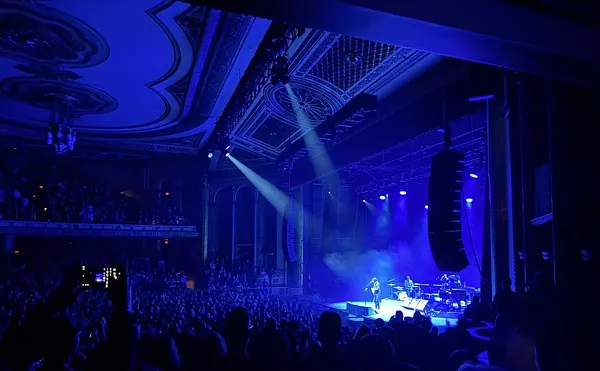
Audio By Carbonatix
[
{
"name": "GPT - Leaderboard - Inline - Content",
"component": "35519556",
"insertPoint": "5th",
"startingPoint": "3",
"requiredCountToDisplay": "3",
"maxInsertions": 100,
"adList": [
{
"adPreset": "LeaderboardInline"
}
]
}
]
So just what the heck is a "girl group" supposed to sound like in the year 2000? There’s still a specter hanging over the moniker, certainly. Intact images of rebel girls in love, perfectly ratted hair, miniskirts and spot-on backing vocals litter the popular landscape. Empowered proto-grrls such as Ronnie Spector and the Shangri-Las provided B-movie auteurs such as Herschell Gordon Lewis (anyone remember such gems as Gore Gore Girls or She-Devils on Wheels?) with inspiration and pop-culture permission for deb-girl-gang exploitation flicks that, today, are past retro-kitsch chic and have settled into a quiet corner of our pop culture unconscious.
The girl-gang aesthetic and myth was semisuccessfully used by a high-grade, lowbrow Svengali named Kim Fowley to create a gang of his own named the Runaways. And the riot grrl crew successfully absorbed the tough-as-leather Jett, Ford, Currie and company into their own righteous musical agenda, as well as the punk DIY language, ethos and techniques, subverting decades of not only pop culture, but also a male-dominated musiculture and all of its corporate baggage.
So it is that Berlin’s Cobra Killer is the very epitome of a "girl group" in the year 2000 – an extension of "Oh Bondage, Up Yours!" and a reappropriation of inappropriate sleaze. And, most of all, Cobra Killer’s exceedingly visceral despite a skittish, distracting surface.
This duo’s radical reinvention of the ‘60s girl group-via-DIY punk-via-post-postmodern cultural pastiche has kicked off the new musical century with an agitated shout. Cobra Killer – comprised of Gina D’Orrio and Annika – ups the ante on the recent cut-and-paste, homemade collage-pop of contemporaries and comrades such as Cibo Mato and, particularly, Kathleen Hanna’s Julie Ruin persona. The sampled rumblings – usually long-forgotten scores from long-forgotten flicks – support the beguile-and-berate shouts, rants, readings and staccato blasts of vocals that personify the affair. But, behind the kitsch, the volume and the exceedingly short attention span, D’Orrio and Annika craft a subtler mix of rhythm, noise, beats and assertions that flit away from any funk before the boredom sets in. They’ve tapped into a vision of a common, chaotic, urban unconscious with the sonic tools of an obsolete man-culture. And, you know what? One can’t help but imagine an unironic smile springing from the duo as they pull their own strings.





